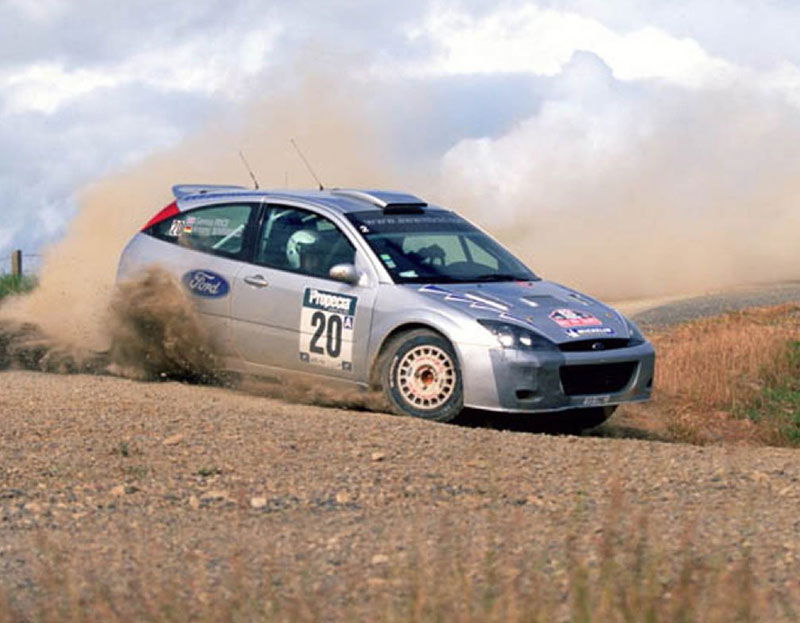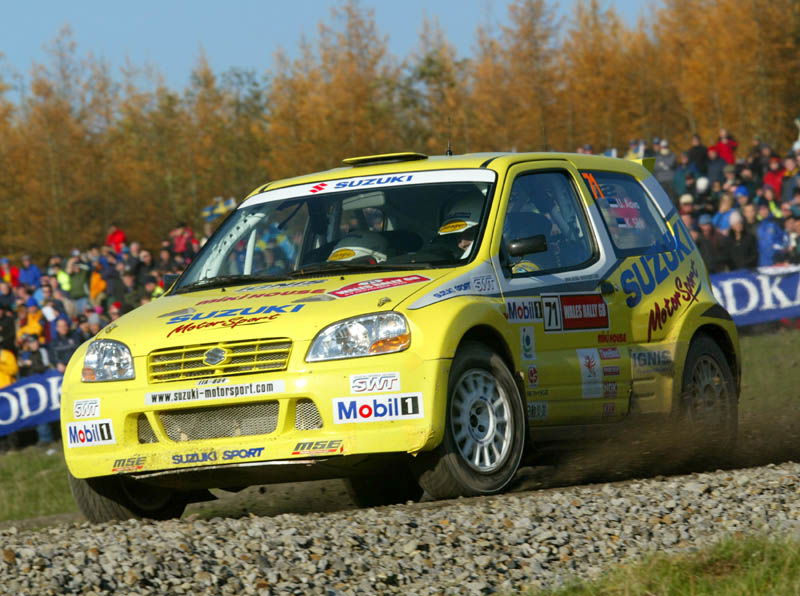WRC Ford focus - Markko Martin.
Ford's decision to continue with their WRC programme in 2004 meant they would be retaining the services of Markko Martin, which took the Estonian off of Subaru's shopping list to replace Richard Burns. Here we have a look at how Markko worked his way up to the top.
Ford's decision to continue with their WRC programme in 2004 meant they would be retaining the services of Markko Martin, which took the Estonian off of Subaru's shopping list to replace Richard Burns. Here we have a look at how Markko worked his way up to the top.
Back in 2002, Ford and the M-Sport concern which runs the Ford WRC effort, could call upon the massive experience of Carlos Sainz and Colin McRae in both rallies and in the development of the Ford Focus WRC. This was quite some experience; by the end of 2002 the McRae/Sainz driver duo had some 49 World Rally Championship wins between them and two world rally championship titles.
But, for 2003 there would be no McRae and no Sainz at Ford, with Estonian Markko Martin the new lead driver, and Frenchman Francois Duval, replacing them. To say the decision to ditch the two most successful rally drivers ever, and replace them with a combination who had never won an event between them raised eyebrows is more than just a slight understatement.
But, change was afoot, and Ford's challenge for 2003 was to be technically led. The car would provide the thrust of the effort with its radical developments from the previous Focus. Big name drivers, on the other hand, were not to be on the agenda. Crucially, by not paying the rather large salaries of the Scot and the Spaniard, a great deal of that money could be either saved, or channelled towards technical development.
In a lot of ways Ford's change of emphasis in their rally programme mirrored their approach with their Jaguar branded F1 effort. The leaping Cat had been faring even worse in its domain than the Ford rally programme, but the approach was the same. Where the rally programme lost its high cost but experienced stars, the F1 effort lost the long experienced and once title contender Eddie Irvine and the previously highly rated Pedro de la Rosa.
In F1, Mark Webber was the new first driver, and there's more parallels between him and Markko Martin than just the similar first names. Both were thrust into high-profile roles replacing illustrious predecessors, both took to the pressure without an issue and performed excellently during the course of their season, and both ended the year with a great deal of interest from other teams.
For Martin it's been a year during which he well and truly has made his mark. In his native Estonia he's now such a star that even grandmothers debate which tyre compound he should be using on the stages, or at least that's what he jokes about the level of attention he now gets at home, attention that you suspect he would far rather be without.
In 2003 Marrko took his first World Rally Championship win, though it has been longer in coming than many may think. Markko, son of a famous rally driver in Estonia, competed in his first rally back in 1994 when he was a mere nineteen years old. The car? That world renowned rally weapon, the Lada Samara.
Markko and the Lada performed admirably. In his first season he finished second in the Estonian rally championship - which ain't too bad for your first year of competition. The next year Markko went one better and took the two-wheel drive rally championship title. The evidence was clear right from the outset, Markko was clearly destined for better things.
1996 marked Martin's first relationship with the Ford marque, as he sold the Lada and replaced it with a Group N Ford Escort. Martin piloted this to second in the Estonian championship and then sold it for a Toyota, after winning his first rally outright when driving an ex-works car from the Japanese concern.
By 1999 Markko was back with Ford, driving a Ford Escort WRC on the Swedish and Portuguese rallies before being provided by Toyota with an ex-works Corolla WRC which he promptly took to fifth place on the Acropolis Rally, clearly an event he performs well on.
For 2000 Markko continued with the Corolla, but he also had a spell in a Subaru Impreza, winning an international championship rally in the Azores. Martin moved to Subaru and the Prodrive team the following year and notched up a fifth place on Rally Finland.
2000 was the year that Markko got together with Brit Michael Park, or Beef as he is nick-named, as co-driver. Michael can look back on experience sitting beside David Higgins and he also worked in Richard Burns' gravel crew. The relationship between Markko and Park has mainly been a good one; ". I think Michael is a very, very professional co-driver, probably one of the best in the championship at the moment and he's a very nice guy so I don't have any problems with him," said Markko about his partner in the car at the end of 2003.
As a driver Markko is certainly measured and calm. Where Ford team-mate Francois Duval might make hundreds of gearchanges on one of the longer rally stages, Markko is far more measured and will achieve that same stage having undertaken a mere fraction of the gearshifts of the frantic Frenchman.
As far as the media attention goes, he'd probably far rather go without that, but you suspect that once he's out of the limelight and in the company of friends he knows just how to let his hair down and have a good time. Not that there's much time for that to happen with the gruelling schedule of a WRC today.
Markko has certainly been someone not to be scared to voice his opinion. Whether it is the safety aspect of a particular stage on a rally, or the controversial rule changes for 2004 Marrko states his mind, which is exactly what you want from a rally driver. Preened circuit drivers in hospitality suites can toe the corporate line, but rally drivers caked in mud and bleeding from a hastily completed repair mid-stage are expected to give a bit more.
As a measure of Markko's worth, when Subaru found itself without the services of Richard Burns for 2004, Markko was at the head of their list for possible replacements. But the Estonian knows a good thing when he's got it and his loyalty to the Ford marque was rewarded by the company confirming their 2004 WRC campaign.
At the end of the 2003 season Markko was clearly tired after a long and busy year and on the last couple of rallies he was finding his sport quite literally a pain in the neck, nursing as he was a neck injury from the Corsican Rally.
But, 2003 was a season he could look back at with pride. After fine performances in New Zealand and Argentina where his strong showings were ultimately hit by retirement, Markko took his first WRC victory in the Acropolis Rally in Greece in June, then he went in to take the Finland Rally, only the third non Scandinavian to accomplish the feat.
Now, for 2004, Markko continues his fine union with the WRC Ford Focus and come the season opener in January at the Monte Carlo Rally, he should be right on the pace.
In the next instalment we have a look at some of the others in the team behind the Ford WRC effort.






